Business Law: UK Legal System, Impact, Solutions and Recommendations
VerifiedAdded on 2024/06/11
|22
|5931
|102
Report
AI Summary
This report provides a comprehensive analysis of the UK legal system and its impact on businesses. It begins by explaining the nature of the English legal system, including the sources of law and the laws that organizations must comply with. It elaborates on the role of government in law-making, differentiating between statutory and common law. The report then illustrates the potential impact of company, employment, and contract law on businesses, analyzing the effects of regulations, legislation, and standards. Furthermore, it suggests appropriate legal solutions for various business problems, such as termination of contract, insolvency, and liquidation, while assessing the positive and negative impacts of these solutions. Finally, the report recommends legal solutions based on different legal frameworks and compares their effectiveness, providing a critical review of the use of appropriate legal solutions compared with alternative legal advice. This document is for informational purposes and Desklib provides a platform to access similar assignments.
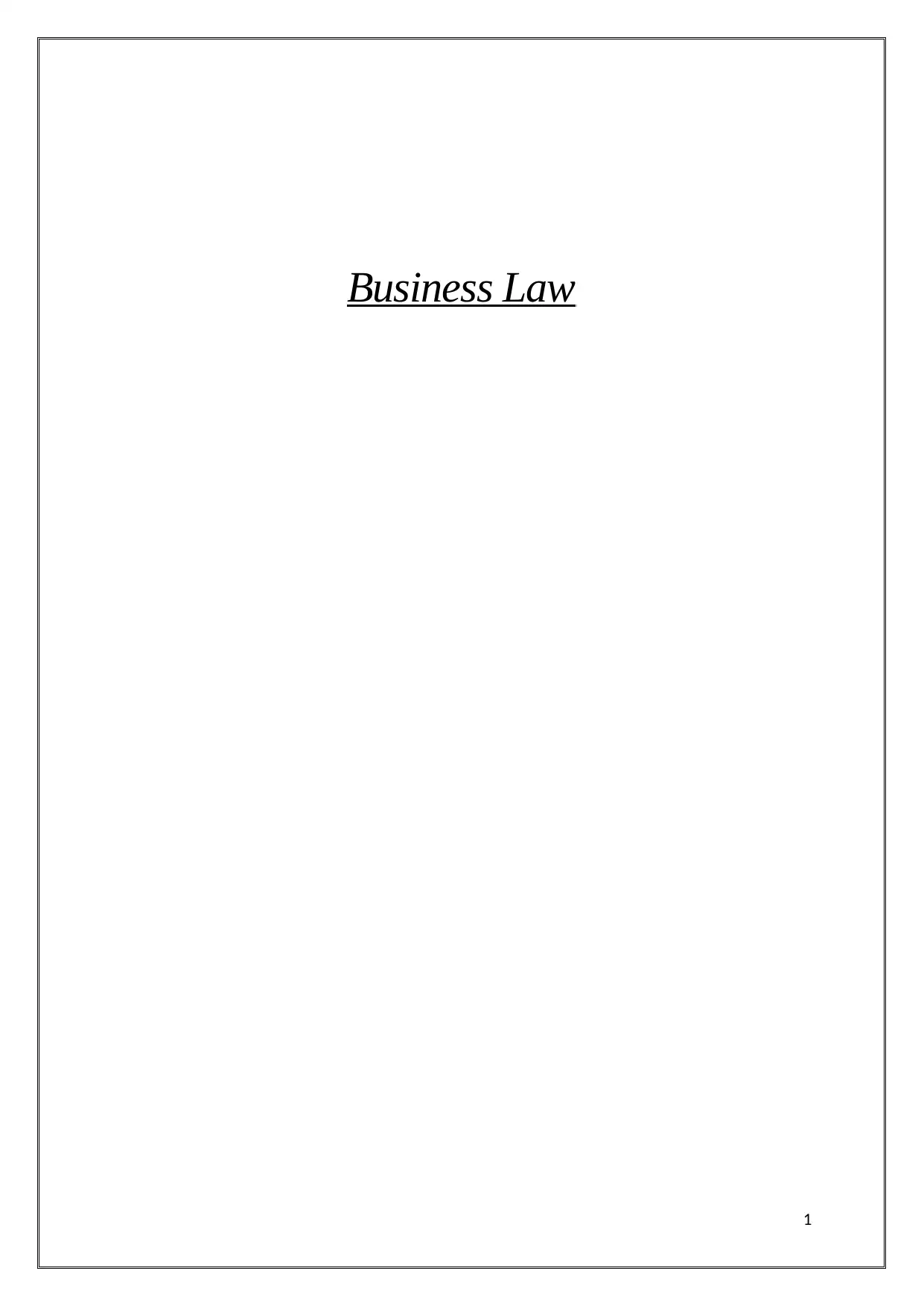
Business Law
1
1
Paraphrase This Document
Need a fresh take? Get an instant paraphrase of this document with our AI Paraphraser
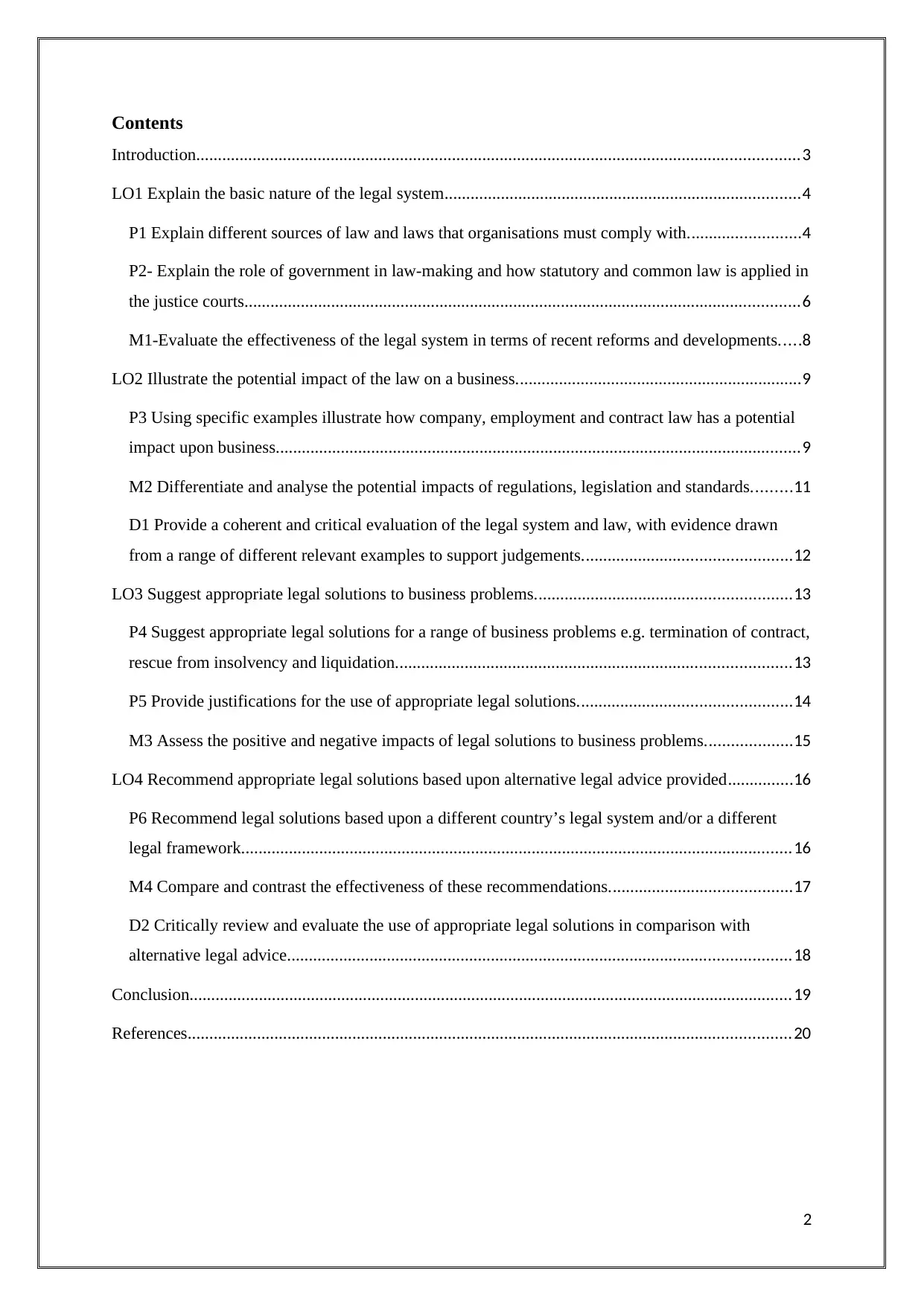
Contents
Introduction...........................................................................................................................................3
LO1 Explain the basic nature of the legal system..................................................................................4
P1 Explain different sources of law and laws that organisations must comply with..........................4
P2- Explain the role of government in law-making and how statutory and common law is applied in
the justice courts................................................................................................................................6
M1-Evaluate the effectiveness of the legal system in terms of recent reforms and developments.....8
LO2 Illustrate the potential impact of the law on a business..................................................................9
P3 Using specific examples illustrate how company, employment and contract law has a potential
impact upon business.........................................................................................................................9
M2 Differentiate and analyse the potential impacts of regulations, legislation and standards.........11
D1 Provide a coherent and critical evaluation of the legal system and law, with evidence drawn
from a range of different relevant examples to support judgements................................................12
LO3 Suggest appropriate legal solutions to business problems...........................................................13
P4 Suggest appropriate legal solutions for a range of business problems e.g. termination of contract,
rescue from insolvency and liquidation...........................................................................................13
P5 Provide justifications for the use of appropriate legal solutions.................................................14
M3 Assess the positive and negative impacts of legal solutions to business problems....................15
LO4 Recommend appropriate legal solutions based upon alternative legal advice provided...............16
P6 Recommend legal solutions based upon a different country’s legal system and/or a different
legal framework...............................................................................................................................16
M4 Compare and contrast the effectiveness of these recommendations..........................................17
D2 Critically review and evaluate the use of appropriate legal solutions in comparison with
alternative legal advice....................................................................................................................18
Conclusion...........................................................................................................................................19
References...........................................................................................................................................20
2
Introduction...........................................................................................................................................3
LO1 Explain the basic nature of the legal system..................................................................................4
P1 Explain different sources of law and laws that organisations must comply with..........................4
P2- Explain the role of government in law-making and how statutory and common law is applied in
the justice courts................................................................................................................................6
M1-Evaluate the effectiveness of the legal system in terms of recent reforms and developments.....8
LO2 Illustrate the potential impact of the law on a business..................................................................9
P3 Using specific examples illustrate how company, employment and contract law has a potential
impact upon business.........................................................................................................................9
M2 Differentiate and analyse the potential impacts of regulations, legislation and standards.........11
D1 Provide a coherent and critical evaluation of the legal system and law, with evidence drawn
from a range of different relevant examples to support judgements................................................12
LO3 Suggest appropriate legal solutions to business problems...........................................................13
P4 Suggest appropriate legal solutions for a range of business problems e.g. termination of contract,
rescue from insolvency and liquidation...........................................................................................13
P5 Provide justifications for the use of appropriate legal solutions.................................................14
M3 Assess the positive and negative impacts of legal solutions to business problems....................15
LO4 Recommend appropriate legal solutions based upon alternative legal advice provided...............16
P6 Recommend legal solutions based upon a different country’s legal system and/or a different
legal framework...............................................................................................................................16
M4 Compare and contrast the effectiveness of these recommendations..........................................17
D2 Critically review and evaluate the use of appropriate legal solutions in comparison with
alternative legal advice....................................................................................................................18
Conclusion...........................................................................................................................................19
References...........................................................................................................................................20
2
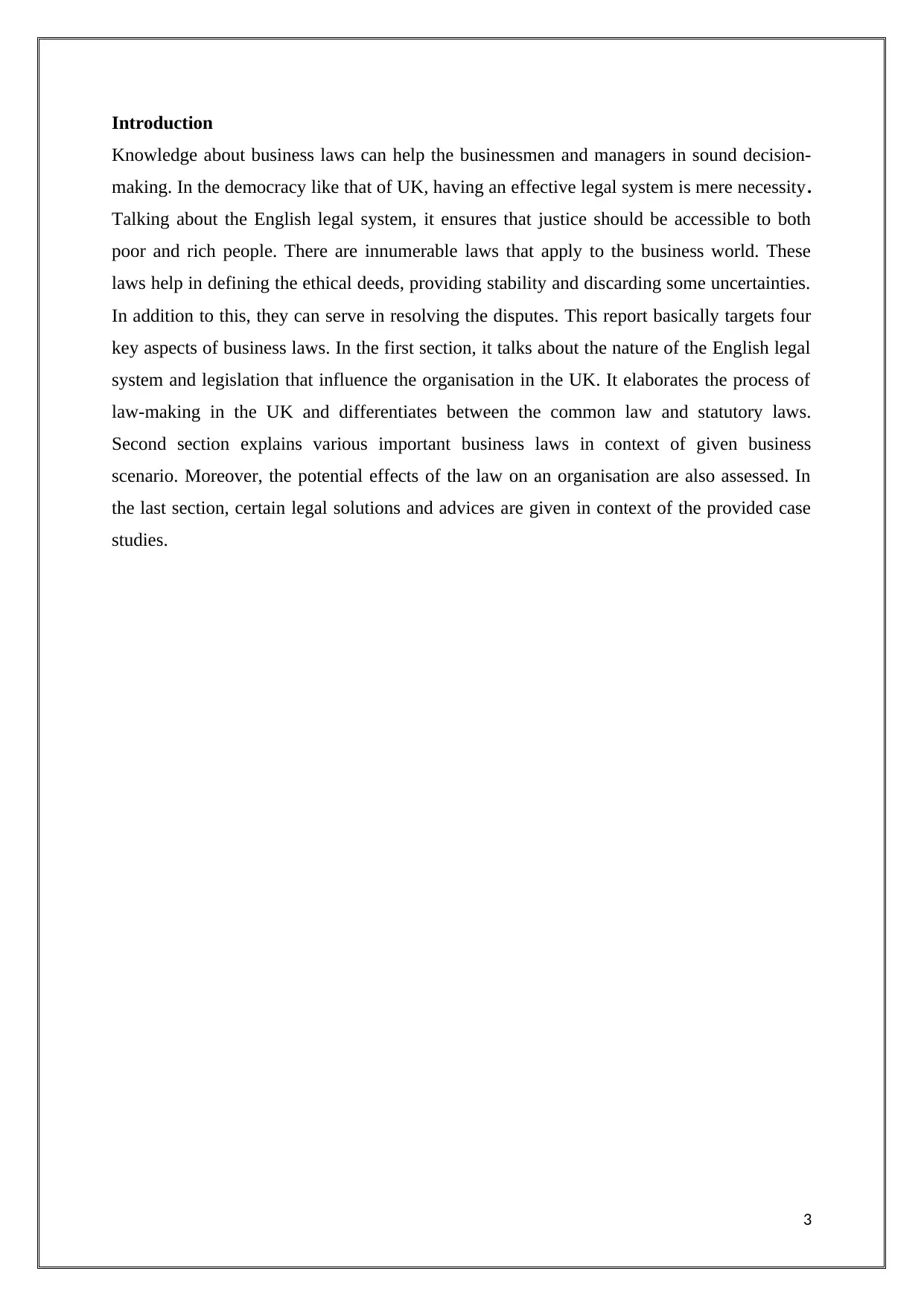
Introduction
Knowledge about business laws can help the businessmen and managers in sound decision-
making. In the democracy like that of UK, having an effective legal system is mere necessity.
Talking about the English legal system, it ensures that justice should be accessible to both
poor and rich people. There are innumerable laws that apply to the business world. These
laws help in defining the ethical deeds, providing stability and discarding some uncertainties.
In addition to this, they can serve in resolving the disputes. This report basically targets four
key aspects of business laws. In the first section, it talks about the nature of the English legal
system and legislation that influence the organisation in the UK. It elaborates the process of
law-making in the UK and differentiates between the common law and statutory laws.
Second section explains various important business laws in context of given business
scenario. Moreover, the potential effects of the law on an organisation are also assessed. In
the last section, certain legal solutions and advices are given in context of the provided case
studies.
3
Knowledge about business laws can help the businessmen and managers in sound decision-
making. In the democracy like that of UK, having an effective legal system is mere necessity.
Talking about the English legal system, it ensures that justice should be accessible to both
poor and rich people. There are innumerable laws that apply to the business world. These
laws help in defining the ethical deeds, providing stability and discarding some uncertainties.
In addition to this, they can serve in resolving the disputes. This report basically targets four
key aspects of business laws. In the first section, it talks about the nature of the English legal
system and legislation that influence the organisation in the UK. It elaborates the process of
law-making in the UK and differentiates between the common law and statutory laws.
Second section explains various important business laws in context of given business
scenario. Moreover, the potential effects of the law on an organisation are also assessed. In
the last section, certain legal solutions and advices are given in context of the provided case
studies.
3
⊘ This is a preview!⊘
Do you want full access?
Subscribe today to unlock all pages.

Trusted by 1+ million students worldwide
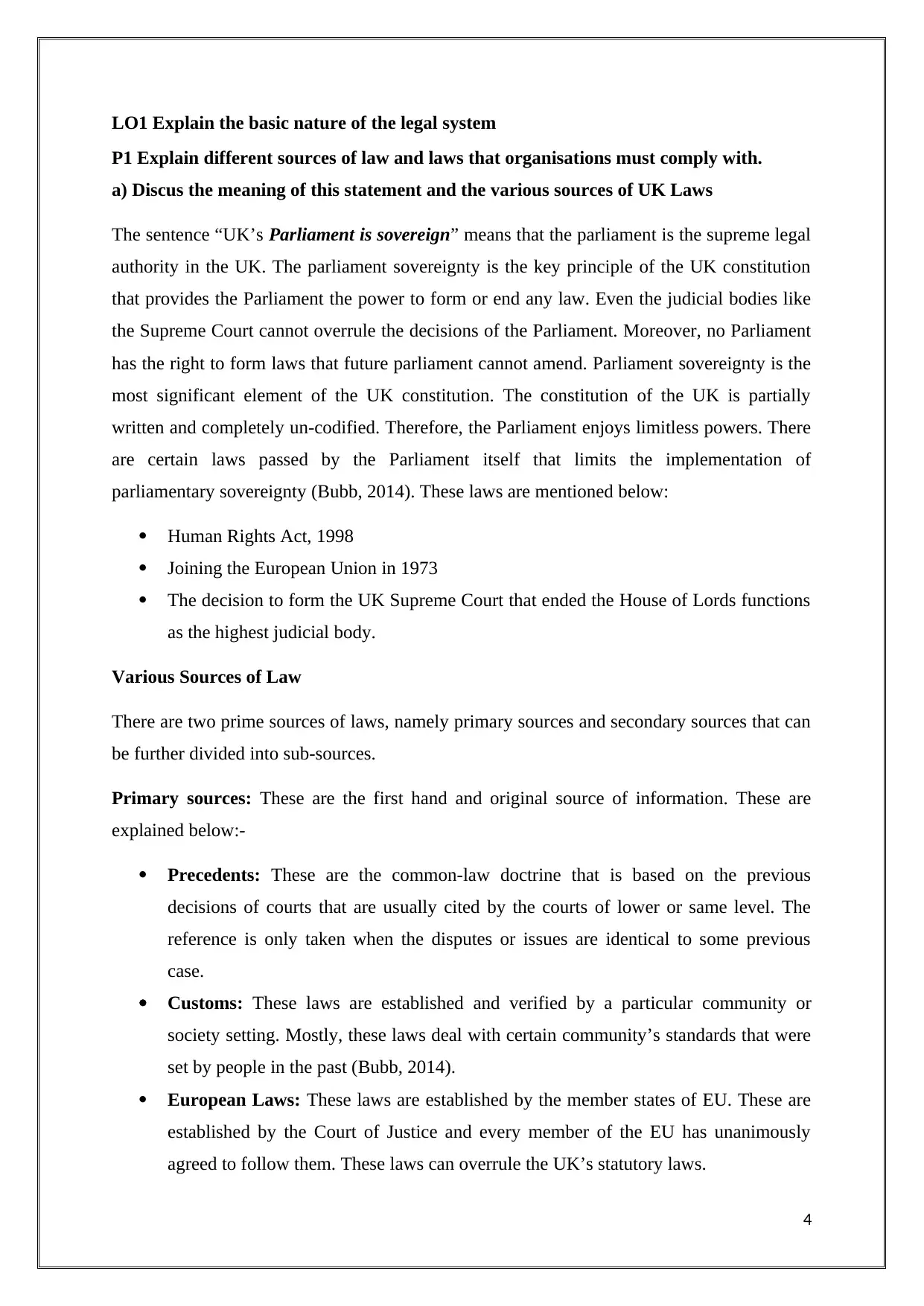
LO1 Explain the basic nature of the legal system
P1 Explain different sources of law and laws that organisations must comply with.
a) Discus the meaning of this statement and the various sources of UK Laws
The sentence “UK’s Parliament is sovereign” means that the parliament is the supreme legal
authority in the UK. The parliament sovereignty is the key principle of the UK constitution
that provides the Parliament the power to form or end any law. Even the judicial bodies like
the Supreme Court cannot overrule the decisions of the Parliament. Moreover, no Parliament
has the right to form laws that future parliament cannot amend. Parliament sovereignty is the
most significant element of the UK constitution. The constitution of the UK is partially
written and completely un-codified. Therefore, the Parliament enjoys limitless powers. There
are certain laws passed by the Parliament itself that limits the implementation of
parliamentary sovereignty (Bubb, 2014). These laws are mentioned below:
Human Rights Act, 1998
Joining the European Union in 1973
The decision to form the UK Supreme Court that ended the House of Lords functions
as the highest judicial body.
Various Sources of Law
There are two prime sources of laws, namely primary sources and secondary sources that can
be further divided into sub-sources.
Primary sources: These are the first hand and original source of information. These are
explained below:-
Precedents: These are the common-law doctrine that is based on the previous
decisions of courts that are usually cited by the courts of lower or same level. The
reference is only taken when the disputes or issues are identical to some previous
case.
Customs: These laws are established and verified by a particular community or
society setting. Mostly, these laws deal with certain community’s standards that were
set by people in the past (Bubb, 2014).
European Laws: These laws are established by the member states of EU. These are
established by the Court of Justice and every member of the EU has unanimously
agreed to follow them. These laws can overrule the UK’s statutory laws.
4
P1 Explain different sources of law and laws that organisations must comply with.
a) Discus the meaning of this statement and the various sources of UK Laws
The sentence “UK’s Parliament is sovereign” means that the parliament is the supreme legal
authority in the UK. The parliament sovereignty is the key principle of the UK constitution
that provides the Parliament the power to form or end any law. Even the judicial bodies like
the Supreme Court cannot overrule the decisions of the Parliament. Moreover, no Parliament
has the right to form laws that future parliament cannot amend. Parliament sovereignty is the
most significant element of the UK constitution. The constitution of the UK is partially
written and completely un-codified. Therefore, the Parliament enjoys limitless powers. There
are certain laws passed by the Parliament itself that limits the implementation of
parliamentary sovereignty (Bubb, 2014). These laws are mentioned below:
Human Rights Act, 1998
Joining the European Union in 1973
The decision to form the UK Supreme Court that ended the House of Lords functions
as the highest judicial body.
Various Sources of Law
There are two prime sources of laws, namely primary sources and secondary sources that can
be further divided into sub-sources.
Primary sources: These are the first hand and original source of information. These are
explained below:-
Precedents: These are the common-law doctrine that is based on the previous
decisions of courts that are usually cited by the courts of lower or same level. The
reference is only taken when the disputes or issues are identical to some previous
case.
Customs: These laws are established and verified by a particular community or
society setting. Mostly, these laws deal with certain community’s standards that were
set by people in the past (Bubb, 2014).
European Laws: These laws are established by the member states of EU. These are
established by the Court of Justice and every member of the EU has unanimously
agreed to follow them. These laws can overrule the UK’s statutory laws.
4
Paraphrase This Document
Need a fresh take? Get an instant paraphrase of this document with our AI Paraphraser
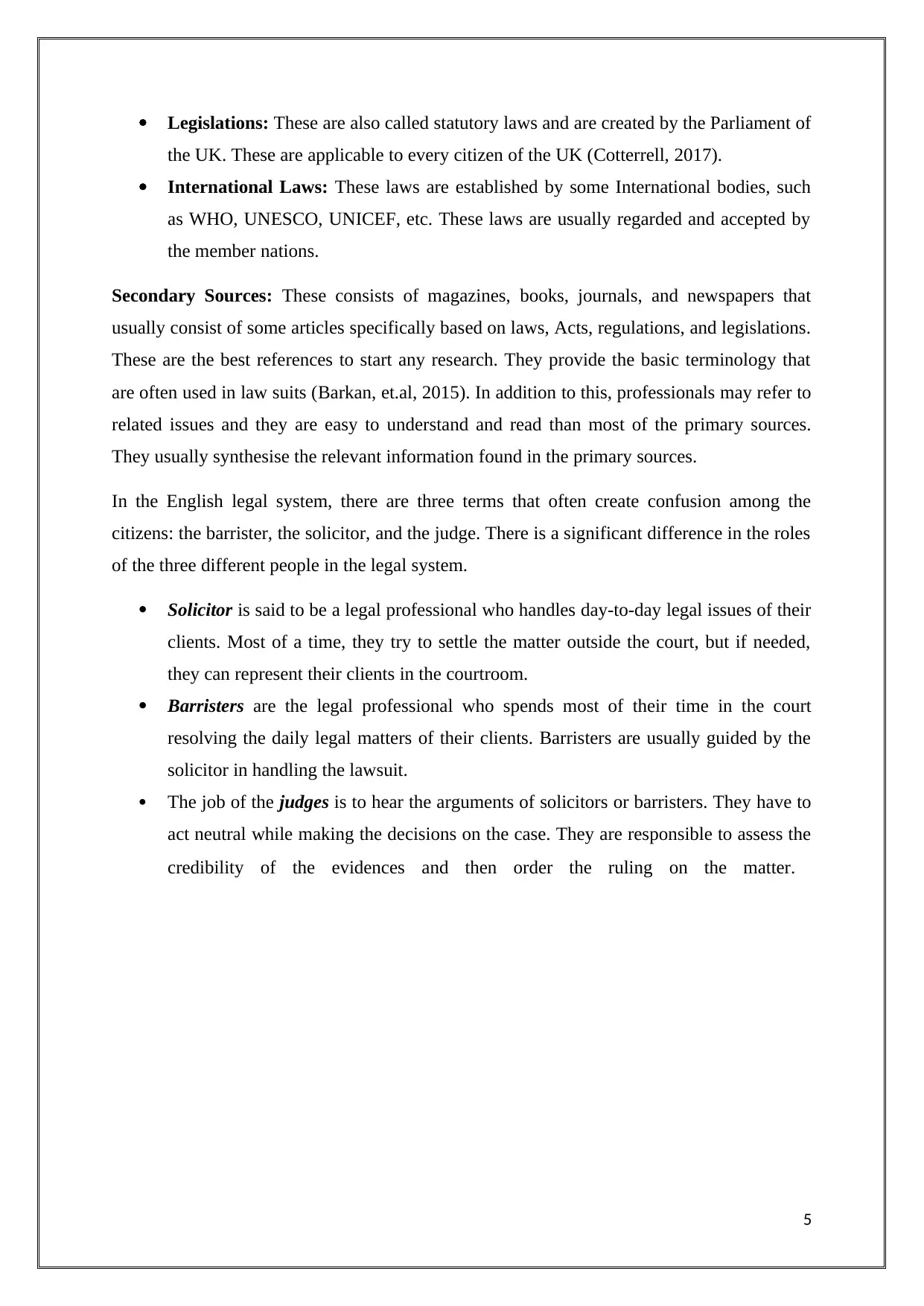
Legislations: These are also called statutory laws and are created by the Parliament of
the UK. These are applicable to every citizen of the UK (Cotterrell, 2017).
International Laws: These laws are established by some International bodies, such
as WHO, UNESCO, UNICEF, etc. These laws are usually regarded and accepted by
the member nations.
Secondary Sources: These consists of magazines, books, journals, and newspapers that
usually consist of some articles specifically based on laws, Acts, regulations, and legislations.
These are the best references to start any research. They provide the basic terminology that
are often used in law suits (Barkan, et.al, 2015). In addition to this, professionals may refer to
related issues and they are easy to understand and read than most of the primary sources.
They usually synthesise the relevant information found in the primary sources.
In the English legal system, there are three terms that often create confusion among the
citizens: the barrister, the solicitor, and the judge. There is a significant difference in the roles
of the three different people in the legal system.
Solicitor is said to be a legal professional who handles day-to-day legal issues of their
clients. Most of a time, they try to settle the matter outside the court, but if needed,
they can represent their clients in the courtroom.
Barristers are the legal professional who spends most of their time in the court
resolving the daily legal matters of their clients. Barristers are usually guided by the
solicitor in handling the lawsuit.
The job of the judges is to hear the arguments of solicitors or barristers. They have to
act neutral while making the decisions on the case. They are responsible to assess the
credibility of the evidences and then order the ruling on the matter.
5
the UK. These are applicable to every citizen of the UK (Cotterrell, 2017).
International Laws: These laws are established by some International bodies, such
as WHO, UNESCO, UNICEF, etc. These laws are usually regarded and accepted by
the member nations.
Secondary Sources: These consists of magazines, books, journals, and newspapers that
usually consist of some articles specifically based on laws, Acts, regulations, and legislations.
These are the best references to start any research. They provide the basic terminology that
are often used in law suits (Barkan, et.al, 2015). In addition to this, professionals may refer to
related issues and they are easy to understand and read than most of the primary sources.
They usually synthesise the relevant information found in the primary sources.
In the English legal system, there are three terms that often create confusion among the
citizens: the barrister, the solicitor, and the judge. There is a significant difference in the roles
of the three different people in the legal system.
Solicitor is said to be a legal professional who handles day-to-day legal issues of their
clients. Most of a time, they try to settle the matter outside the court, but if needed,
they can represent their clients in the courtroom.
Barristers are the legal professional who spends most of their time in the court
resolving the daily legal matters of their clients. Barristers are usually guided by the
solicitor in handling the lawsuit.
The job of the judges is to hear the arguments of solicitors or barristers. They have to
act neutral while making the decisions on the case. They are responsible to assess the
credibility of the evidences and then order the ruling on the matter.
5
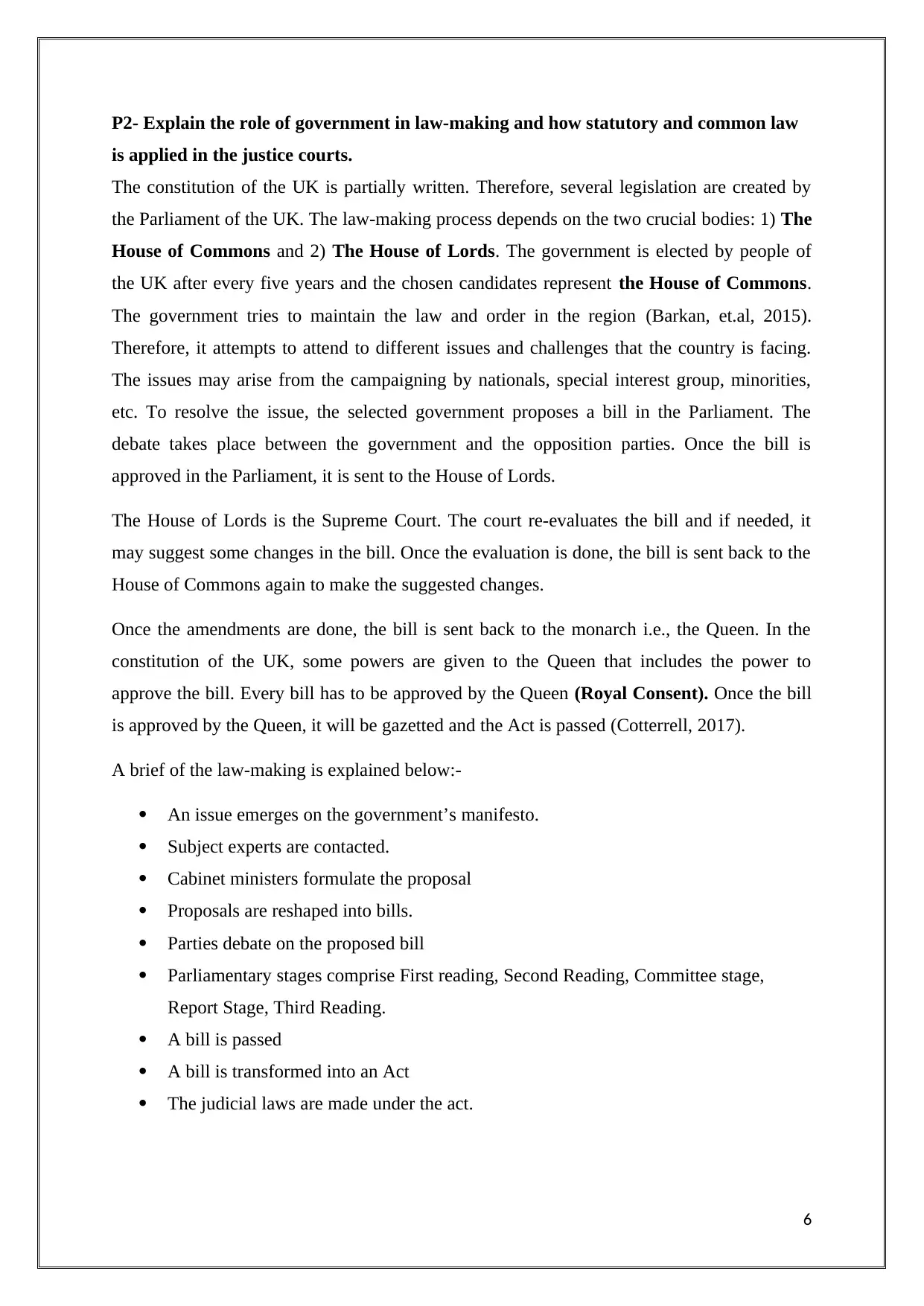
P2- Explain the role of government in law-making and how statutory and common law
is applied in the justice courts.
The constitution of the UK is partially written. Therefore, several legislation are created by
the Parliament of the UK. The law-making process depends on the two crucial bodies: 1) The
House of Commons and 2) The House of Lords. The government is elected by people of
the UK after every five years and the chosen candidates represent the House of Commons.
The government tries to maintain the law and order in the region (Barkan, et.al, 2015).
Therefore, it attempts to attend to different issues and challenges that the country is facing.
The issues may arise from the campaigning by nationals, special interest group, minorities,
etc. To resolve the issue, the selected government proposes a bill in the Parliament. The
debate takes place between the government and the opposition parties. Once the bill is
approved in the Parliament, it is sent to the House of Lords.
The House of Lords is the Supreme Court. The court re-evaluates the bill and if needed, it
may suggest some changes in the bill. Once the evaluation is done, the bill is sent back to the
House of Commons again to make the suggested changes.
Once the amendments are done, the bill is sent back to the monarch i.e., the Queen. In the
constitution of the UK, some powers are given to the Queen that includes the power to
approve the bill. Every bill has to be approved by the Queen (Royal Consent). Once the bill
is approved by the Queen, it will be gazetted and the Act is passed (Cotterrell, 2017).
A brief of the law-making is explained below:-
An issue emerges on the government’s manifesto.
Subject experts are contacted.
Cabinet ministers formulate the proposal
Proposals are reshaped into bills.
Parties debate on the proposed bill
Parliamentary stages comprise First reading, Second Reading, Committee stage,
Report Stage, Third Reading.
A bill is passed
A bill is transformed into an Act
The judicial laws are made under the act.
6
is applied in the justice courts.
The constitution of the UK is partially written. Therefore, several legislation are created by
the Parliament of the UK. The law-making process depends on the two crucial bodies: 1) The
House of Commons and 2) The House of Lords. The government is elected by people of
the UK after every five years and the chosen candidates represent the House of Commons.
The government tries to maintain the law and order in the region (Barkan, et.al, 2015).
Therefore, it attempts to attend to different issues and challenges that the country is facing.
The issues may arise from the campaigning by nationals, special interest group, minorities,
etc. To resolve the issue, the selected government proposes a bill in the Parliament. The
debate takes place between the government and the opposition parties. Once the bill is
approved in the Parliament, it is sent to the House of Lords.
The House of Lords is the Supreme Court. The court re-evaluates the bill and if needed, it
may suggest some changes in the bill. Once the evaluation is done, the bill is sent back to the
House of Commons again to make the suggested changes.
Once the amendments are done, the bill is sent back to the monarch i.e., the Queen. In the
constitution of the UK, some powers are given to the Queen that includes the power to
approve the bill. Every bill has to be approved by the Queen (Royal Consent). Once the bill
is approved by the Queen, it will be gazetted and the Act is passed (Cotterrell, 2017).
A brief of the law-making is explained below:-
An issue emerges on the government’s manifesto.
Subject experts are contacted.
Cabinet ministers formulate the proposal
Proposals are reshaped into bills.
Parties debate on the proposed bill
Parliamentary stages comprise First reading, Second Reading, Committee stage,
Report Stage, Third Reading.
A bill is passed
A bill is transformed into an Act
The judicial laws are made under the act.
6
⊘ This is a preview!⊘
Do you want full access?
Subscribe today to unlock all pages.

Trusted by 1+ million students worldwide
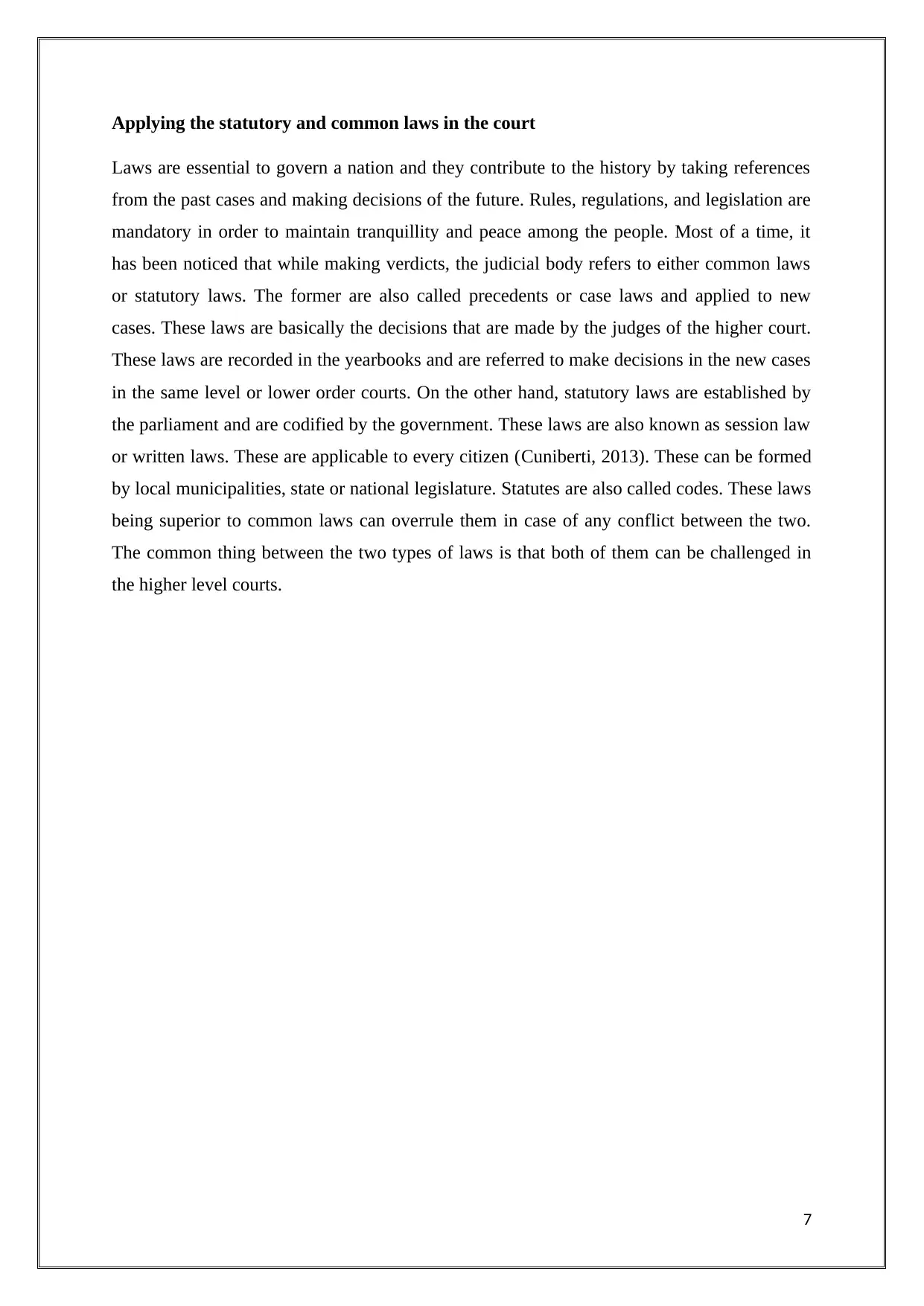
Applying the statutory and common laws in the court
Laws are essential to govern a nation and they contribute to the history by taking references
from the past cases and making decisions of the future. Rules, regulations, and legislation are
mandatory in order to maintain tranquillity and peace among the people. Most of a time, it
has been noticed that while making verdicts, the judicial body refers to either common laws
or statutory laws. The former are also called precedents or case laws and applied to new
cases. These laws are basically the decisions that are made by the judges of the higher court.
These laws are recorded in the yearbooks and are referred to make decisions in the new cases
in the same level or lower order courts. On the other hand, statutory laws are established by
the parliament and are codified by the government. These laws are also known as session law
or written laws. These are applicable to every citizen (Cuniberti, 2013). These can be formed
by local municipalities, state or national legislature. Statutes are also called codes. These laws
being superior to common laws can overrule them in case of any conflict between the two.
The common thing between the two types of laws is that both of them can be challenged in
the higher level courts.
7
Laws are essential to govern a nation and they contribute to the history by taking references
from the past cases and making decisions of the future. Rules, regulations, and legislation are
mandatory in order to maintain tranquillity and peace among the people. Most of a time, it
has been noticed that while making verdicts, the judicial body refers to either common laws
or statutory laws. The former are also called precedents or case laws and applied to new
cases. These laws are basically the decisions that are made by the judges of the higher court.
These laws are recorded in the yearbooks and are referred to make decisions in the new cases
in the same level or lower order courts. On the other hand, statutory laws are established by
the parliament and are codified by the government. These laws are also known as session law
or written laws. These are applicable to every citizen (Cuniberti, 2013). These can be formed
by local municipalities, state or national legislature. Statutes are also called codes. These laws
being superior to common laws can overrule them in case of any conflict between the two.
The common thing between the two types of laws is that both of them can be challenged in
the higher level courts.
7
Paraphrase This Document
Need a fresh take? Get an instant paraphrase of this document with our AI Paraphraser
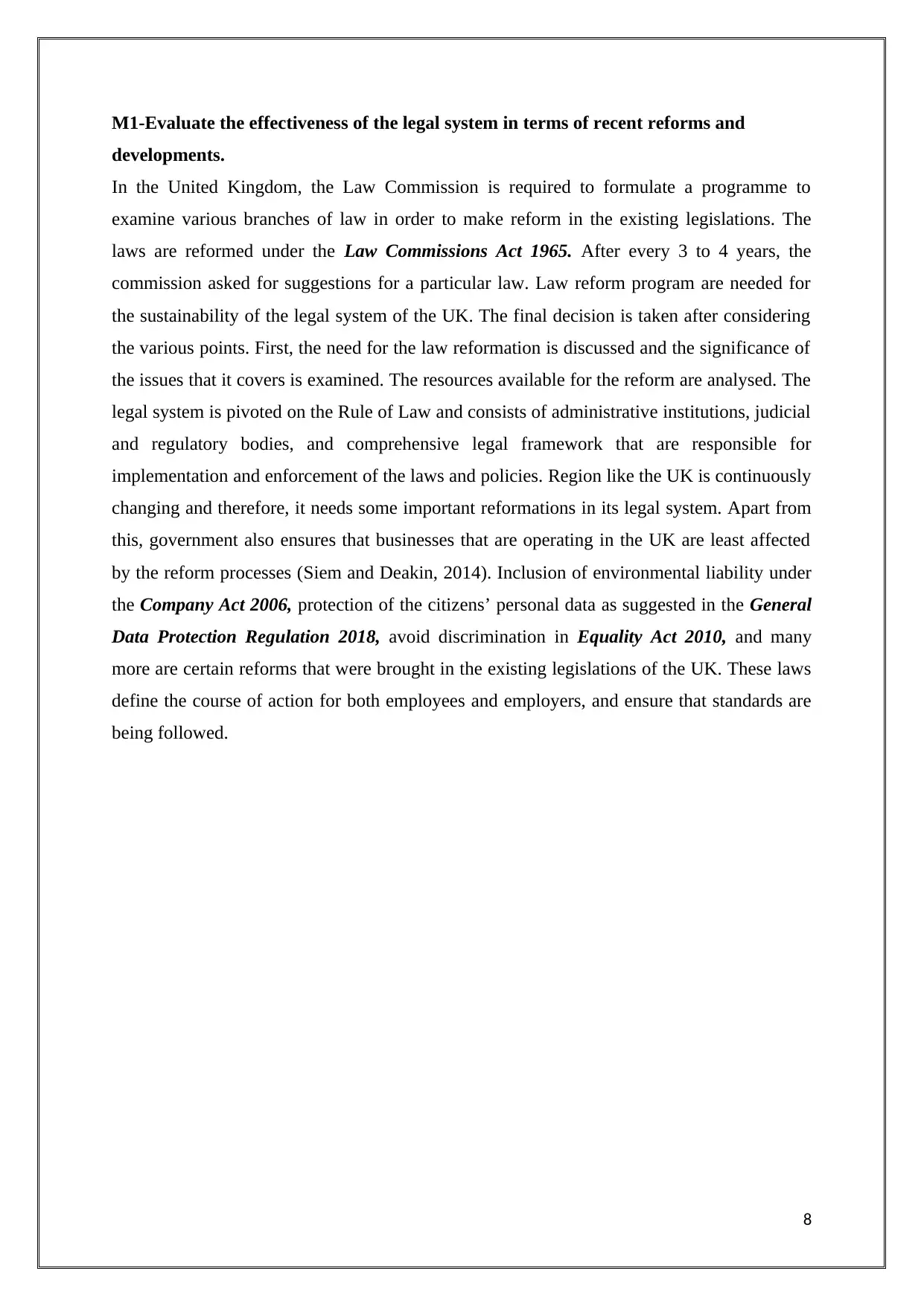
M1-Evaluate the effectiveness of the legal system in terms of recent reforms and
developments.
In the United Kingdom, the Law Commission is required to formulate a programme to
examine various branches of law in order to make reform in the existing legislations. The
laws are reformed under the Law Commissions Act 1965. After every 3 to 4 years, the
commission asked for suggestions for a particular law. Law reform program are needed for
the sustainability of the legal system of the UK. The final decision is taken after considering
the various points. First, the need for the law reformation is discussed and the significance of
the issues that it covers is examined. The resources available for the reform are analysed. The
legal system is pivoted on the Rule of Law and consists of administrative institutions, judicial
and regulatory bodies, and comprehensive legal framework that are responsible for
implementation and enforcement of the laws and policies. Region like the UK is continuously
changing and therefore, it needs some important reformations in its legal system. Apart from
this, government also ensures that businesses that are operating in the UK are least affected
by the reform processes (Siem and Deakin, 2014). Inclusion of environmental liability under
the Company Act 2006, protection of the citizens’ personal data as suggested in the General
Data Protection Regulation 2018, avoid discrimination in Equality Act 2010, and many
more are certain reforms that were brought in the existing legislations of the UK. These laws
define the course of action for both employees and employers, and ensure that standards are
being followed.
8
developments.
In the United Kingdom, the Law Commission is required to formulate a programme to
examine various branches of law in order to make reform in the existing legislations. The
laws are reformed under the Law Commissions Act 1965. After every 3 to 4 years, the
commission asked for suggestions for a particular law. Law reform program are needed for
the sustainability of the legal system of the UK. The final decision is taken after considering
the various points. First, the need for the law reformation is discussed and the significance of
the issues that it covers is examined. The resources available for the reform are analysed. The
legal system is pivoted on the Rule of Law and consists of administrative institutions, judicial
and regulatory bodies, and comprehensive legal framework that are responsible for
implementation and enforcement of the laws and policies. Region like the UK is continuously
changing and therefore, it needs some important reformations in its legal system. Apart from
this, government also ensures that businesses that are operating in the UK are least affected
by the reform processes (Siem and Deakin, 2014). Inclusion of environmental liability under
the Company Act 2006, protection of the citizens’ personal data as suggested in the General
Data Protection Regulation 2018, avoid discrimination in Equality Act 2010, and many
more are certain reforms that were brought in the existing legislations of the UK. These laws
define the course of action for both employees and employers, and ensure that standards are
being followed.
8
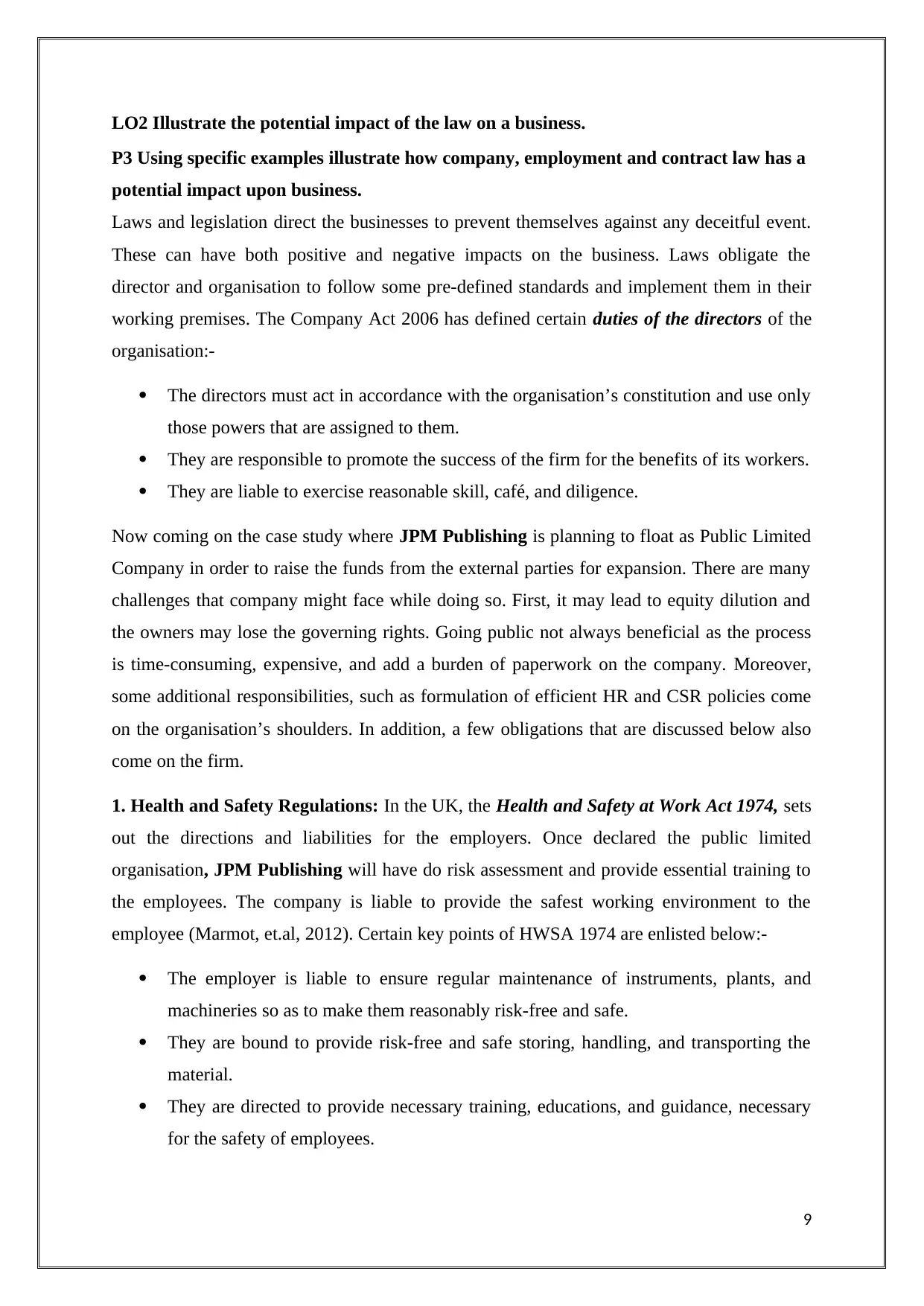
LO2 Illustrate the potential impact of the law on a business.
P3 Using specific examples illustrate how company, employment and contract law has a
potential impact upon business.
Laws and legislation direct the businesses to prevent themselves against any deceitful event.
These can have both positive and negative impacts on the business. Laws obligate the
director and organisation to follow some pre-defined standards and implement them in their
working premises. The Company Act 2006 has defined certain duties of the directors of the
organisation:-
The directors must act in accordance with the organisation’s constitution and use only
those powers that are assigned to them.
They are responsible to promote the success of the firm for the benefits of its workers.
They are liable to exercise reasonable skill, café, and diligence.
Now coming on the case study where JPM Publishing is planning to float as Public Limited
Company in order to raise the funds from the external parties for expansion. There are many
challenges that company might face while doing so. First, it may lead to equity dilution and
the owners may lose the governing rights. Going public not always beneficial as the process
is time-consuming, expensive, and add a burden of paperwork on the company. Moreover,
some additional responsibilities, such as formulation of efficient HR and CSR policies come
on the organisation’s shoulders. In addition, a few obligations that are discussed below also
come on the firm.
1. Health and Safety Regulations: In the UK, the Health and Safety at Work Act 1974, sets
out the directions and liabilities for the employers. Once declared the public limited
organisation, JPM Publishing will have do risk assessment and provide essential training to
the employees. The company is liable to provide the safest working environment to the
employee (Marmot, et.al, 2012). Certain key points of HWSA 1974 are enlisted below:-
The employer is liable to ensure regular maintenance of instruments, plants, and
machineries so as to make them reasonably risk-free and safe.
They are bound to provide risk-free and safe storing, handling, and transporting the
material.
They are directed to provide necessary training, educations, and guidance, necessary
for the safety of employees.
9
P3 Using specific examples illustrate how company, employment and contract law has a
potential impact upon business.
Laws and legislation direct the businesses to prevent themselves against any deceitful event.
These can have both positive and negative impacts on the business. Laws obligate the
director and organisation to follow some pre-defined standards and implement them in their
working premises. The Company Act 2006 has defined certain duties of the directors of the
organisation:-
The directors must act in accordance with the organisation’s constitution and use only
those powers that are assigned to them.
They are responsible to promote the success of the firm for the benefits of its workers.
They are liable to exercise reasonable skill, café, and diligence.
Now coming on the case study where JPM Publishing is planning to float as Public Limited
Company in order to raise the funds from the external parties for expansion. There are many
challenges that company might face while doing so. First, it may lead to equity dilution and
the owners may lose the governing rights. Going public not always beneficial as the process
is time-consuming, expensive, and add a burden of paperwork on the company. Moreover,
some additional responsibilities, such as formulation of efficient HR and CSR policies come
on the organisation’s shoulders. In addition, a few obligations that are discussed below also
come on the firm.
1. Health and Safety Regulations: In the UK, the Health and Safety at Work Act 1974, sets
out the directions and liabilities for the employers. Once declared the public limited
organisation, JPM Publishing will have do risk assessment and provide essential training to
the employees. The company is liable to provide the safest working environment to the
employee (Marmot, et.al, 2012). Certain key points of HWSA 1974 are enlisted below:-
The employer is liable to ensure regular maintenance of instruments, plants, and
machineries so as to make them reasonably risk-free and safe.
They are bound to provide risk-free and safe storing, handling, and transporting the
material.
They are directed to provide necessary training, educations, and guidance, necessary
for the safety of employees.
9
⊘ This is a preview!⊘
Do you want full access?
Subscribe today to unlock all pages.

Trusted by 1+ million students worldwide
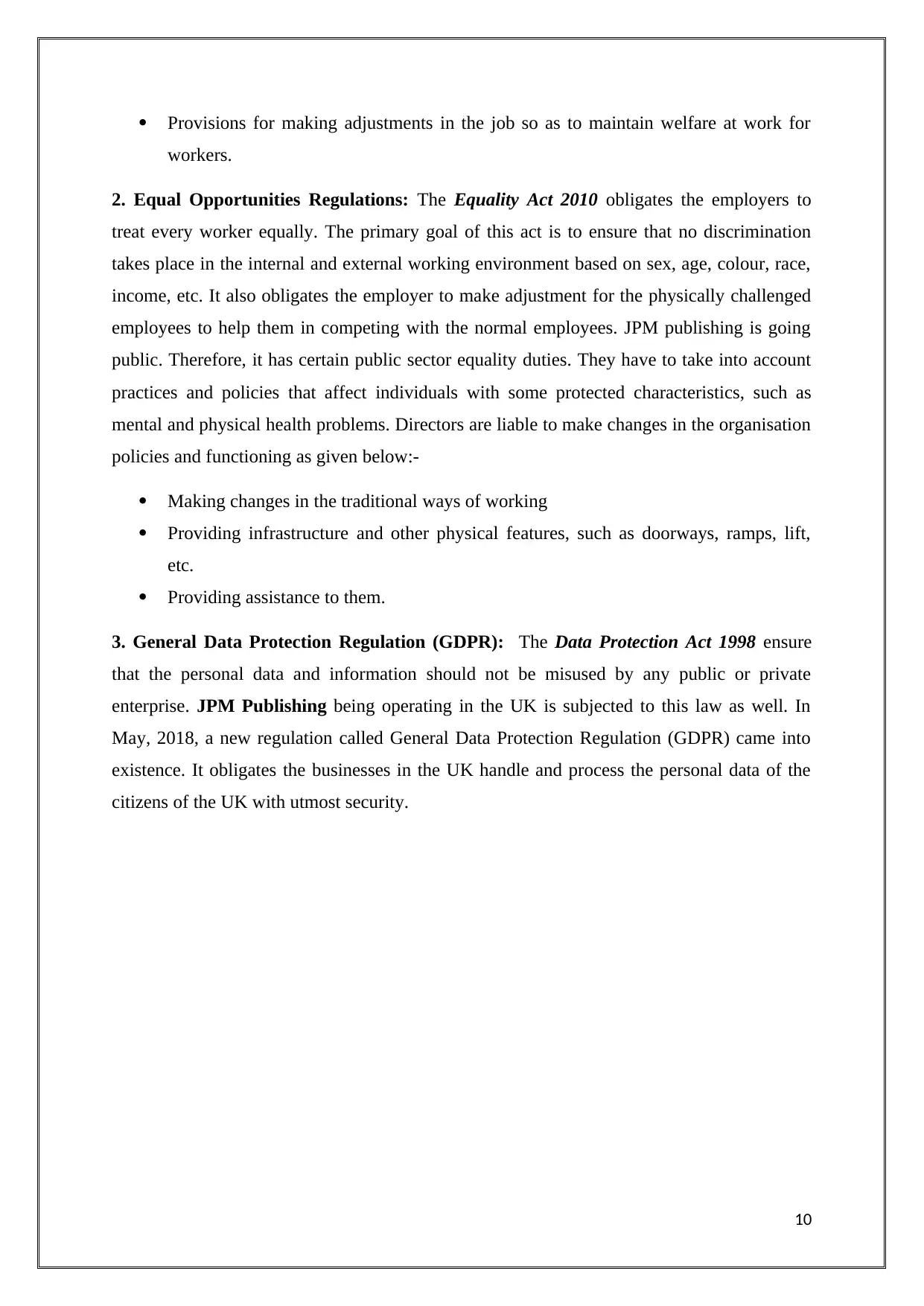
Provisions for making adjustments in the job so as to maintain welfare at work for
workers.
2. Equal Opportunities Regulations: The Equality Act 2010 obligates the employers to
treat every worker equally. The primary goal of this act is to ensure that no discrimination
takes place in the internal and external working environment based on sex, age, colour, race,
income, etc. It also obligates the employer to make adjustment for the physically challenged
employees to help them in competing with the normal employees. JPM publishing is going
public. Therefore, it has certain public sector equality duties. They have to take into account
practices and policies that affect individuals with some protected characteristics, such as
mental and physical health problems. Directors are liable to make changes in the organisation
policies and functioning as given below:-
Making changes in the traditional ways of working
Providing infrastructure and other physical features, such as doorways, ramps, lift,
etc.
Providing assistance to them.
3. General Data Protection Regulation (GDPR): The Data Protection Act 1998 ensure
that the personal data and information should not be misused by any public or private
enterprise. JPM Publishing being operating in the UK is subjected to this law as well. In
May, 2018, a new regulation called General Data Protection Regulation (GDPR) came into
existence. It obligates the businesses in the UK handle and process the personal data of the
citizens of the UK with utmost security.
10
workers.
2. Equal Opportunities Regulations: The Equality Act 2010 obligates the employers to
treat every worker equally. The primary goal of this act is to ensure that no discrimination
takes place in the internal and external working environment based on sex, age, colour, race,
income, etc. It also obligates the employer to make adjustment for the physically challenged
employees to help them in competing with the normal employees. JPM publishing is going
public. Therefore, it has certain public sector equality duties. They have to take into account
practices and policies that affect individuals with some protected characteristics, such as
mental and physical health problems. Directors are liable to make changes in the organisation
policies and functioning as given below:-
Making changes in the traditional ways of working
Providing infrastructure and other physical features, such as doorways, ramps, lift,
etc.
Providing assistance to them.
3. General Data Protection Regulation (GDPR): The Data Protection Act 1998 ensure
that the personal data and information should not be misused by any public or private
enterprise. JPM Publishing being operating in the UK is subjected to this law as well. In
May, 2018, a new regulation called General Data Protection Regulation (GDPR) came into
existence. It obligates the businesses in the UK handle and process the personal data of the
citizens of the UK with utmost security.
10
Paraphrase This Document
Need a fresh take? Get an instant paraphrase of this document with our AI Paraphraser
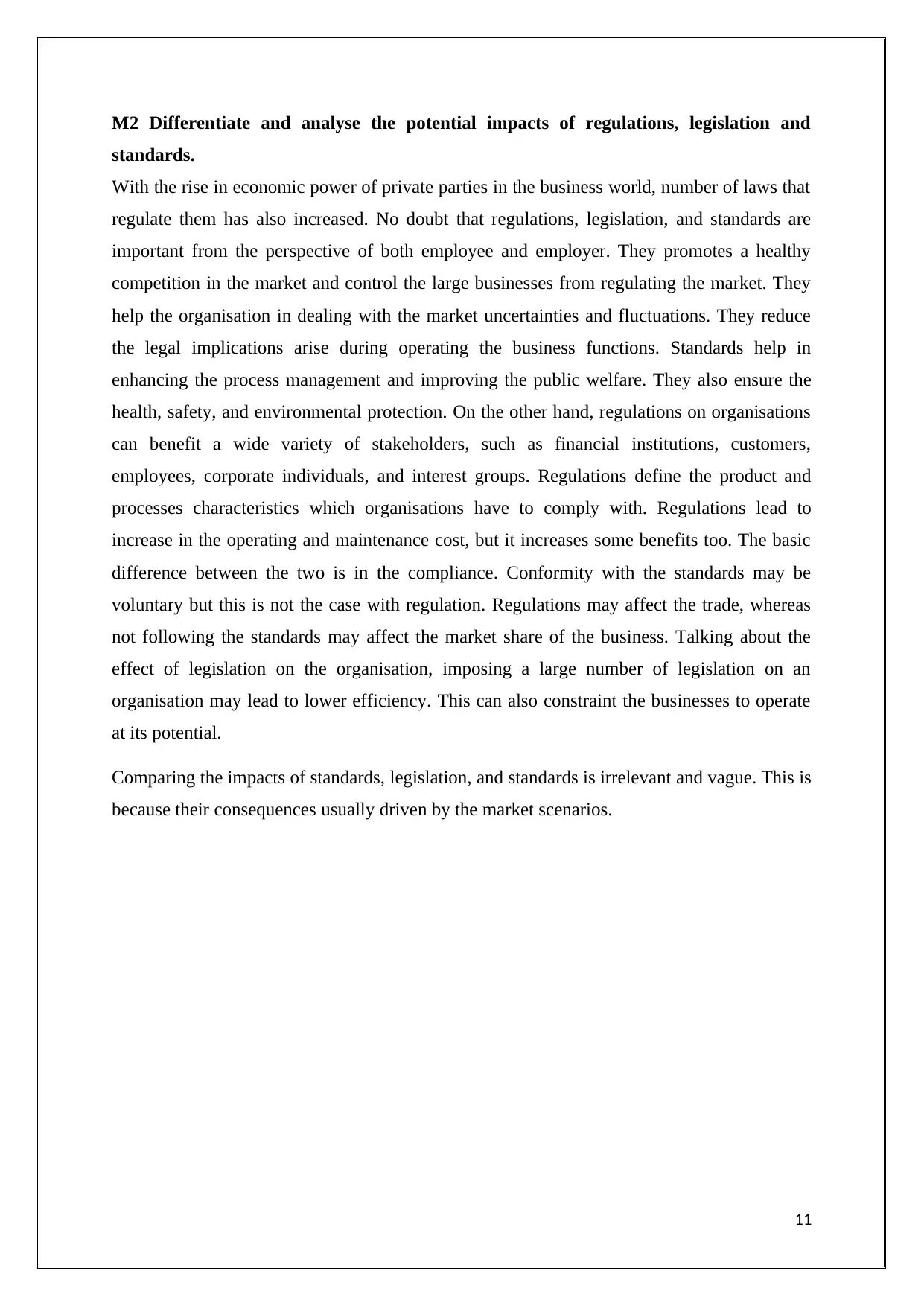
M2 Differentiate and analyse the potential impacts of regulations, legislation and
standards.
With the rise in economic power of private parties in the business world, number of laws that
regulate them has also increased. No doubt that regulations, legislation, and standards are
important from the perspective of both employee and employer. They promotes a healthy
competition in the market and control the large businesses from regulating the market. They
help the organisation in dealing with the market uncertainties and fluctuations. They reduce
the legal implications arise during operating the business functions. Standards help in
enhancing the process management and improving the public welfare. They also ensure the
health, safety, and environmental protection. On the other hand, regulations on organisations
can benefit a wide variety of stakeholders, such as financial institutions, customers,
employees, corporate individuals, and interest groups. Regulations define the product and
processes characteristics which organisations have to comply with. Regulations lead to
increase in the operating and maintenance cost, but it increases some benefits too. The basic
difference between the two is in the compliance. Conformity with the standards may be
voluntary but this is not the case with regulation. Regulations may affect the trade, whereas
not following the standards may affect the market share of the business. Talking about the
effect of legislation on the organisation, imposing a large number of legislation on an
organisation may lead to lower efficiency. This can also constraint the businesses to operate
at its potential.
Comparing the impacts of standards, legislation, and standards is irrelevant and vague. This is
because their consequences usually driven by the market scenarios.
11
standards.
With the rise in economic power of private parties in the business world, number of laws that
regulate them has also increased. No doubt that regulations, legislation, and standards are
important from the perspective of both employee and employer. They promotes a healthy
competition in the market and control the large businesses from regulating the market. They
help the organisation in dealing with the market uncertainties and fluctuations. They reduce
the legal implications arise during operating the business functions. Standards help in
enhancing the process management and improving the public welfare. They also ensure the
health, safety, and environmental protection. On the other hand, regulations on organisations
can benefit a wide variety of stakeholders, such as financial institutions, customers,
employees, corporate individuals, and interest groups. Regulations define the product and
processes characteristics which organisations have to comply with. Regulations lead to
increase in the operating and maintenance cost, but it increases some benefits too. The basic
difference between the two is in the compliance. Conformity with the standards may be
voluntary but this is not the case with regulation. Regulations may affect the trade, whereas
not following the standards may affect the market share of the business. Talking about the
effect of legislation on the organisation, imposing a large number of legislation on an
organisation may lead to lower efficiency. This can also constraint the businesses to operate
at its potential.
Comparing the impacts of standards, legislation, and standards is irrelevant and vague. This is
because their consequences usually driven by the market scenarios.
11
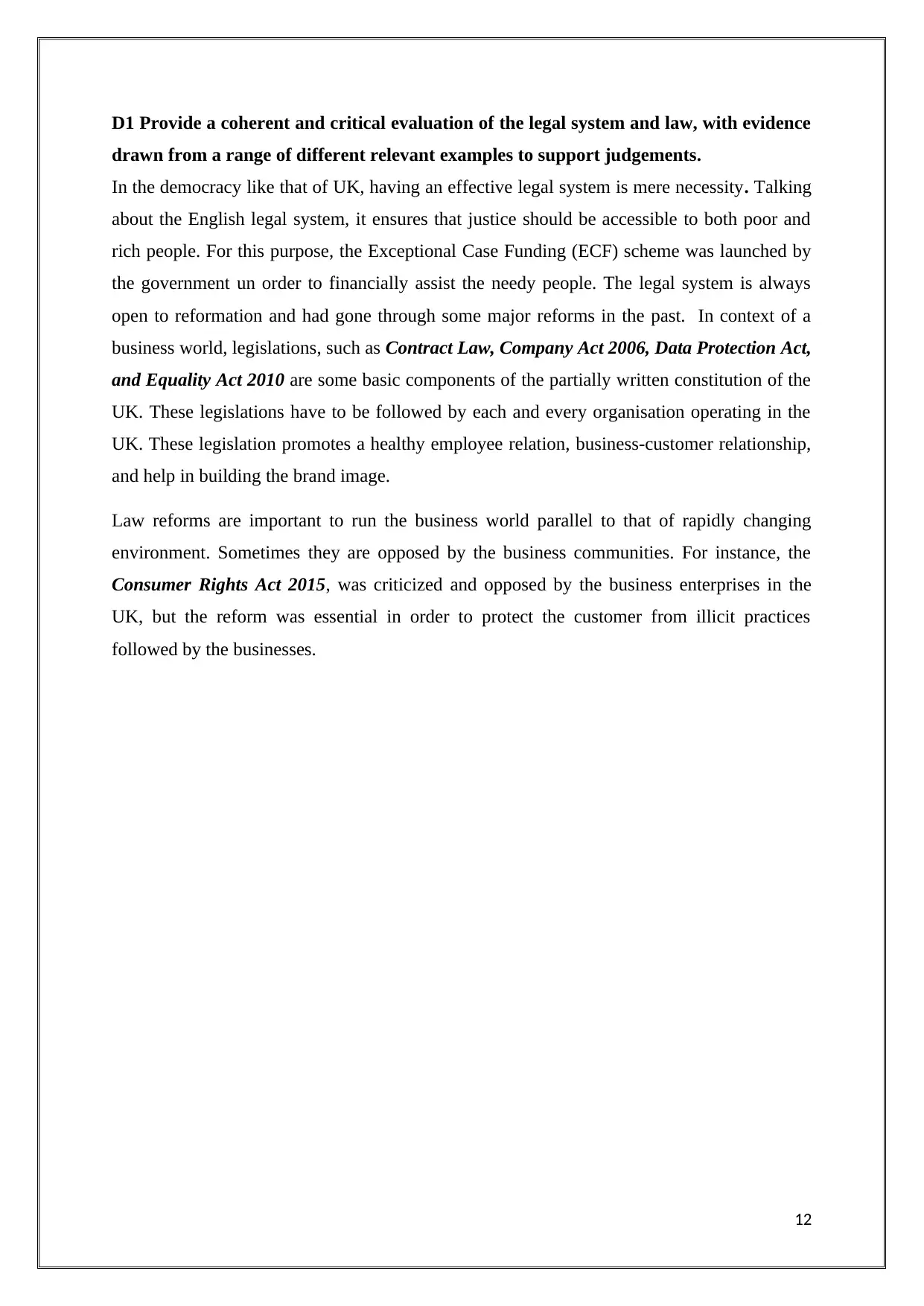
D1 Provide a coherent and critical evaluation of the legal system and law, with evidence
drawn from a range of different relevant examples to support judgements.
In the democracy like that of UK, having an effective legal system is mere necessity. Talking
about the English legal system, it ensures that justice should be accessible to both poor and
rich people. For this purpose, the Exceptional Case Funding (ECF) scheme was launched by
the government un order to financially assist the needy people. The legal system is always
open to reformation and had gone through some major reforms in the past. In context of a
business world, legislations, such as Contract Law, Company Act 2006, Data Protection Act,
and Equality Act 2010 are some basic components of the partially written constitution of the
UK. These legislations have to be followed by each and every organisation operating in the
UK. These legislation promotes a healthy employee relation, business-customer relationship,
and help in building the brand image.
Law reforms are important to run the business world parallel to that of rapidly changing
environment. Sometimes they are opposed by the business communities. For instance, the
Consumer Rights Act 2015, was criticized and opposed by the business enterprises in the
UK, but the reform was essential in order to protect the customer from illicit practices
followed by the businesses.
12
drawn from a range of different relevant examples to support judgements.
In the democracy like that of UK, having an effective legal system is mere necessity. Talking
about the English legal system, it ensures that justice should be accessible to both poor and
rich people. For this purpose, the Exceptional Case Funding (ECF) scheme was launched by
the government un order to financially assist the needy people. The legal system is always
open to reformation and had gone through some major reforms in the past. In context of a
business world, legislations, such as Contract Law, Company Act 2006, Data Protection Act,
and Equality Act 2010 are some basic components of the partially written constitution of the
UK. These legislations have to be followed by each and every organisation operating in the
UK. These legislation promotes a healthy employee relation, business-customer relationship,
and help in building the brand image.
Law reforms are important to run the business world parallel to that of rapidly changing
environment. Sometimes they are opposed by the business communities. For instance, the
Consumer Rights Act 2015, was criticized and opposed by the business enterprises in the
UK, but the reform was essential in order to protect the customer from illicit practices
followed by the businesses.
12
⊘ This is a preview!⊘
Do you want full access?
Subscribe today to unlock all pages.

Trusted by 1+ million students worldwide
1 out of 22
Related Documents
Your All-in-One AI-Powered Toolkit for Academic Success.
+13062052269
info@desklib.com
Available 24*7 on WhatsApp / Email
![[object Object]](/_next/static/media/star-bottom.7253800d.svg)
Unlock your academic potential
Copyright © 2020–2026 A2Z Services. All Rights Reserved. Developed and managed by ZUCOL.





